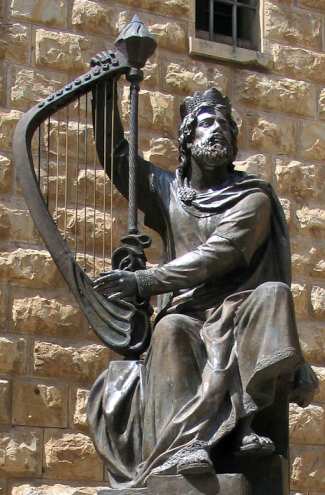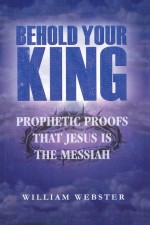Promises of a Messiah: Psalm 110
The Messiah would be a human who would crush the head of Satan, a prophet like Moses who God would require everyone to listen to. But this week we look at a passage with implications so amazing we see it striking people in Bible times speechless.
 Statue of King David at King David’s Tomb in Jerusalem photo courtesy of Kaplar |
Last week we were standing with Moses at the end of his life. We’re going to fast forward about another 420 year later, to the times of King David. A prolific song writer, David was at it again, writing a short song that we know as Psalm 110. An excerpt:
The LORD says to my Lord: "Sit at my right hand, until I make your enemies your footstool." … The LORD has sworn and will not change his mind, "You are a priest forever after the order of Melchizedek." (Psa 110:1,4)
The Mysterious Person
The Name translated as LORD here is the Name of God sometimes translated as Jehovah or Yahweh – the True Eternal God who made Himself known to Israel. But the question is – who is David talking about when he says "my Lord"? It’s similar to the English word – Lord, or master.
Just from these verses alone, the plot thickens. We have someone who Jehovah is speaking to, who David himself holds in high honour. This person is a kingly figure, triumphant over his enemies. And yet, he is also a priest – a priest forever! Not in the Jewish Levitical priestly line, but a more ancient line – that of Melchizedek.
Melchizedeck?
Melchizedeck was another priest-king in the ancient city of Salem. After Abram’s triumph over the kings when he rescued Lot, he was met by this king. Melchizedeck brought Abram provisions, and blessed him, and Abram gave him a tenth of everything. (Gen 14:18-20)
This mysterious king apparently held a position of honour above Abram himself – the person in Psalm 110 is greater than Israel’s great King, and Israel’s great Father.
Speechless
Looking at the Jewish sources before and after Christ, there were some that said the Psalm was talking about the Messiah, and others that said it wasn’t. In sources after Christ, there was eventually a fairly consistent interpretation that this was the Messiah (such as in the Genesis Midrash and Midrash on the Psalms).
But Jesus’ audience apparently did take the passage to be talking about the Messiah – who they also believed to be the Son of David.
The Sadducees and Pharisees had been questioning Jesus – in other words, trying to trap him. Finally, Jesus turned the tables on them, by asking a question about this very Psalm. Whose son is the Messiah, He asked. Well, the Son of David, of course, answered the Pharisees.
He [Jesus] said to them, "How is it then that David, in the Spirit, calls him Lord, saying, ‘The Lord said to my Lord, Sit at my right hand, until I put your enemies under your feet’? If then David calls him Lord, how is he his son?" (Mat 22:43-45)
Of course, the great King David wouldn’t call his own son "Lord", would he? Of course not! Knowing the culture and the use of the word, the Pharisees didn’t know what to say.
They were struck speechless.
There’s only one person greater than a king – Someone Divine.
Prophet, Priest and King
After He rose, Christ ascended to reign as King and intercede on behalf of His people as Priest. The author of Hebrews expands on what David alluded to in this psalm in Hebrews 7. Jesus is not just another priest, daily offering sacrifices that can never take away sin. Jesus is a High Priest of a different kind – an eternal priest who offered Himself once and for all, doing away with the daily sacrifices (Heb 7:27).
Consequently, he is able to save to the uttermost those who draw near to God through him, since he always lives to make intercession for them. (Heb 7:25)
A prophet, a priest, and a king – yet one eternal, unlike any before – Someone Divine. The identity of this person is enough to strike anyone speechless. But as we continue in the weeks ahead, we’ll see some more concrete promises about how the Messiah could be identified, and what He would do. More next week!
 |
As a starting point for my posts, I’m reading Behold Your King: Prophetic Proofs That Jesus Is The Messiah by William Webster. In his book, he talks about many more prophecies and how they were fulfilled by Jesus. He also focuses on how various Jewish sources interpreted these passages.
If you want to take your study one step further, you can order the book by clicking the image to the right.

1 November 2009 @ 5:57 pm
Jim: I checked out the verses you quote above in Matthew and read on to verse 46. I think it further emphasizes the fact that these religious leaders were indeed “struck speechless.” It reads, “And no one was able to answer Him a word, nor from that day on did anyone dare question Him anymore.”
I also read about the book you’re using from the link you provided. Looks very good.
26 March 2012 @ 8:27 am
We like your dissertation on Psalms 110 and that you are missionaries in Mexico. We have produced the Divine Name King James Bible to showcase the Divine Name Jehovah which is already prominently displayed to Spanish speaking people everywhere as a result of the Biblia del Oso. http://www.dnkjb.net
Here you quote from translations that do remove the Divine Name but apparently you freely use the name Jehovah and thus have no aversion to it. Do you prefer the Nueva Versión Internacional for helping people to understand Jesus more clearly?
With these thoughts in mind we would like your opinion on the DNKJB if you have time to give one.